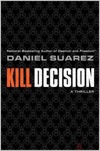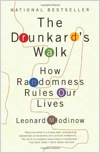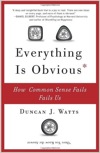It seems that I'm late posting this year's "what I read this summer" post. That's to be expected, since I'm behind on the reading pile, too. But summer is giving us an encore this week, so here's my chance to share some of the interesting things I've read with you.
 Attack of the killer drones
Attack of the killer drones
I read mostly nonfiction these days, but I did take a summer diversion with two books by Daniel Suarez, who's making a run for the techno-thriller trophy. The first was Freedom™, which is more part two than sequel to Daemon (recommended in the 2010 list). If you liked Daemon and haven't read Freedom™ yet, you need to find out how the story ends.
Suarez's new book, Kill Decision, takes the same approach of combining current technology with a dose of near-future science fiction, but this time the threat is from autonomous swarms of killer drones. This one's weaker as a novel, but it raises serious issues: Black-hat PR in social media. The use, abuse, and proliferation of armed UAVs, persistent surveillance, and open-source intelligence. The attribution challenge of cyber warfare. By pushing these themes (and others) to an extreme, Suarez creates an opening to think about where the limits are, and where they should be.
If the dawn of the drone age interests you, you can balance the fictional portrayal with Wired for War, P.W. Singer's 2009 book on UAVs and ground-bound robot warriors. You'll wonder what war even is, when one side is far enough from the action to avoid harm. From there, pick up Rachel Maddow's Drift (2012), which—despite the author's well-known leanings—is a generally conservative take on the vanishing checks (in the U.S.) on executive power to make war.
What I like about Suarez is that his novels tie into real-world issues in a way that gets you thinking. These other books prove that the topics Suarez raises are real, even if the specifics include some science fiction.
 Random difficulty
Random difficulty
How improbable is an enjoyable read in statistics and probability? Leonard Mlodinow's The Drunkard's Walk: How Randomness Rules Our Lives (2008) demonstrates how much of what we interpret as cause and effect may be the result of the expected variation in random processes. Baseball stars and hedge-fund winners look a lot like coin tosses, if you look forward into the future instead of backwards into the hindsight.
The Drunkard's Walk gives the best explanation of Bayesian reasoning I've yet encountered, even while using the cancer-screening example that must be required. You also get a chapter on the Monty Hall problem, which is a bit of a mind-bender even after the light comes on. We're really not used to problems that break the rules of the discipline.
Nassim Nicholas Taleb's first book, Fooled by Randomness (2001), covers much of the same territory—people misinterpret randomness habitually—but it returns too often to the financial markets for its lessons and examples. Taleb's forthcoming Antifragile, on the other hand, looks like a must-read this fall. Systems that actually benefit from chaos and black swans? Time for some solid-surface counterintuitive.
 How's that prediction working out?
How's that prediction working out?
Flipping the empirical method around, Duncan Watts tears into our habit of backfitting our analysis to fit past events and calling it common sense in Everything is Obvious (Once You Know the Answer) (2011). In so many different ways, the world is too complex to predict—oh, and randomness is a problem that we don't handle well.
The answer is to respect the unknown, build flexibility into our plans, and get better at reacting quickly instead of trying to predict the future. These are themes I keep running into, and they make a lot of sense. Or is that just my confirmation bias speaking?
The queue is winning
I started Rohit Bhargava's Likeonomics: The Unexpected Truth Behind Earning Trust, Influencing Behavior, and Inspiring Action (2012) this summer, and while I got surprisingly useful ideas from the first couple of chapters, events got in the way. I'll get back to you when I finish that one.
This post has become a bit of a tradition. If you like this, you might enjoy these posts from previous years, too: 2011, 2010
